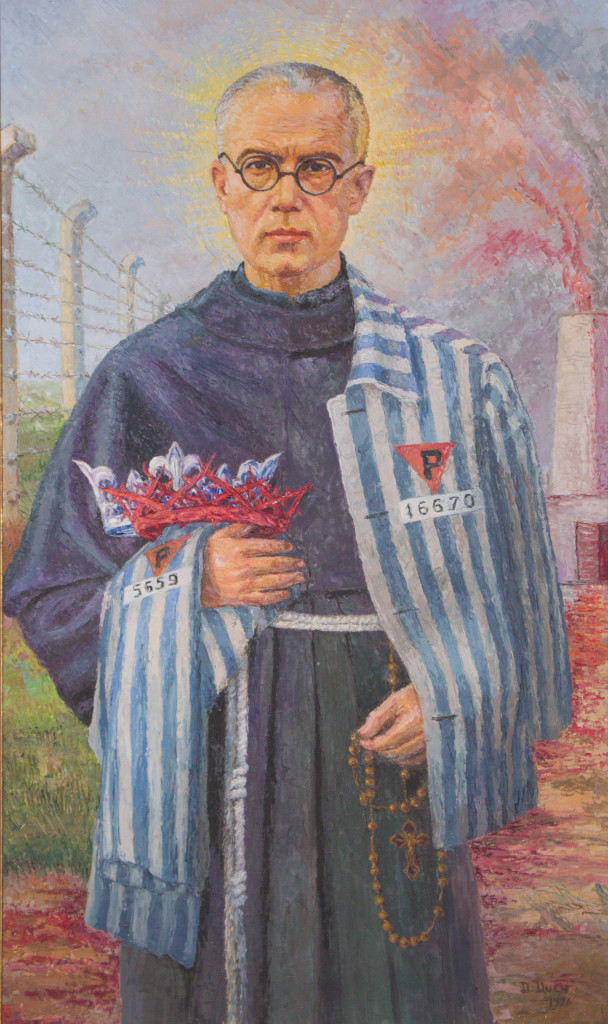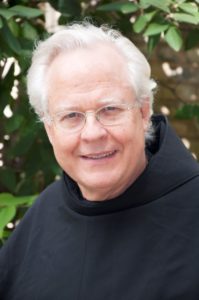 St. Maximilian M. Kolbe – 14 August 2021 – Vigil of the Assumption of Our Lady
St. Maximilian M. Kolbe – 14 August 2021 – Vigil of the Assumption of Our Lady
I Chr 14, 3-4, 15-16; 16, 1-2; 1 Cor 15, 54b-57; Lk 11, 27-28.
Theme: Where, O death, is your victory” (1 Cor 15)
Subtheme: “Blessed is the womb that carried you and the breasts that at which you nursed” (Lk 11).
Licensed to Choose with Truth and a Prayerfully Formed Conscience
America has undergone a sea change in culture. Long gone are the words of a Supreme Court Justice:[1] “We are a religious people whose institutions presuppose a DIvine being,” The spiritual air in America has changed. Ken Starr[2] observes that as a society, America is compartmentalized with outright hostility to faith and the denigration of believers’ moral and religious convictions across America.
Fittingly, Pope Francis compares the Church to a field hospital where emergency care, initial diagnosis, control of infectious diseases, and journey to health begins. I interpret Pope Francis as also subtly pleading for the faithful to think deeply with his imaginative image. Long gone is August 14, 1941 when Fr. Maximilian Kolbe, O.F.M.Conv., was martyred at Auschwitz, his ashes scattered with millions of other victims, including St. Edith Stein, a genius. Long gone is the persecution of the Church seen in East Central Europe between 1946 and 1989. Our grandparents and parents grew up with this. Pope Francis looks ahead with his visionary encyclical Fratelli Tutti, brothers and sisters all. No one is ever left out.
Today, St. Paul’s Letter to the Romans remains indispensably instructive: “When Gentiles who have not the law do by nature what the law requires, they are a law to themselves, even though they do not have the law. They show that what the law requires is written on their hearts, while their conscience also bears witness” (2, 14-15). Fr. Kolbe lived during German National Socialism and a Soviet style of socialism which brutally stifled any and all protests. Hitler made himself deaf to the inner promptings of truth. He was a guilty criminal. The same applies to Stalin. National Socialists were judged at Nuremberg in 1948; the Soviets not yet. Have no doubt that a new Soviet style exists under Putin who gets away with it and knows it. If you have any doubt, ask our Ukrainians at our neighboring Sacred Heart Parish.
If we continue to be vigilant, America’s churches will continue to enjoy the protections in America. Being vigilant is learning the truth with martyrs as Fr. Kolbe, martyr of charity, and St. Edith Stein, a Jewish convert who became a Carmelite nun, was arrested for being Jewish, then martyred in Auschwitz. “Stay sober and alert. Your opponent the devil is prowling like a roaring lion looking for someone to devour. Resist him, solid in your faith” (1 Peter 5, 8-9a).
Sts. Maximilian and Edith Stein met the Lord repeatedly in the wonderous sacrament of the Eucharist, the sacrament in which Jesus continues to love us to the end. To counter the secularist onslaught, let us allow the Eucharistic mystery to awaken wonder in our hearts! St. Clare of Assisi exemplified sublime reverence for the Eucharist. In the Eucharistic mystery, we come to know and to believe in the love God has for us. That is why we receive the Eucharist with a conscience in the best order possible. St. John Henry Newman, the English convert and great Doctor of Conscience, earned moral authority on his genial clarifications about the meaning of conscience and how to recognize a counterfeit conscience. Parents and Catholic teachers, especially, have an unequaled treasure about the subtleties of conscience to best equip their children to live in our secular culture.
The spiritual air in America has changed. The claim that conscience is a free radical is growing, but is not truly Catholic. The false direction needs push back. Catholics join those who seek the truth. Catholics know that we are not the final authority. Truth may appear as shadows as for St. John Henry Newman, but we listen to God deep in our hearts before exercising our conscience by acting. Successive victories in America proves that our freedom is a hard-fought freedom.[3] Freedom of conscience is priceless. Look around the world where public expression of claims to freedom would land us in jail.
A person may never act against convictions that one has arrived at in the moment of acting. If a person has stifled a protest that is from a law written deep in one’s heart, it could be wrong to have arrived at such convictions. Reception of the sacrament of reconciliation is the priceless strengthening.
In America, there will be a constant battle for religious liberty. Hard fought and costly victories, including at the Supreme Court, secured an emerging clarity of principles that makes America the land of the free. Protecting and defending a culture of freedom is a challenge when outright hostility to faith and disparagement of the rights of believers’ moral and religious beliefs is in plain sight. As the culture changes, Catholics contribute to making life in America and in the world more conscious of human dignity, the personal quest for truth, and respect for the primacy of conscience of every individual.
Am I a servant of God or of the State? Duties towards God and duties towards the State often reveal themselves as contraries. Life demands that we make choices. We may be reluctant, but we are not passive to making choices. God helps us to judge how to engage critically the growing secular attitude that religious witness and religious judgments have to be overridden.
Being starved to death without food or water proved Fr. Kolbe’s duties toward God outranked duties towards the State. He joined millions of martyrs and victims whose numbers are increasing and prove that “the Christian is licensed to defer the choice in which we acknowledge that the God revealed by Christ and witnessed in the Scriptures is alone worthy of our adoration and our trust” (Cyril O’Regan).
Fr. Kolbe loved and did not hate the world, the State, or those who were complicit with National Socialism. Fr. Kolbe loved and desired God. He loved Our Lady. He loved learning and the search for knowledge. Always looking ahead, Fr. Kolbe pioneered the power of mass media as an evangelizer and purveyor of truth. What might Fr. Kolbe think of the quest for truth and response of the media today?
At the moment he answered the camp commandant at Auschwitz with “I am a Catholic priest,” Fr. Kolbe exercised freely and openly that he was licensed to choose. He chose to trust and to adore Christ. The commandant, acting in the name of the totalitarian regime, licensed Fr. Kolbe’s execution.
Catholics are licensed to choose, to seek truth, to form conscience, to recognize individual rights, competing views, the need for negotiation and to respect all religions. A breakdown of civility hides a two-edged sword of freedom of religion on one side, while on the other, a secularized society does not always agree with religious judgments. Secular society wants freedom of religion to be policed by law even though law itself is necessarily merely of human origin. If human power is used to override religious judgments, every time believers meet St. Paul: “The sting of death is sin, and the power of sin is the law. But thanks be to God who gives us the victory through our Lord Jesus Christ” (1 Cor 15).
Most of all, Our Lady’s Assumption is the final victory through our Savior Jesus Christ! At our death, Mary our Mother will be with us and have a place for us. Death will never have the final victory!
In Celebration of My Golden Jubilee of Priesthood Homilies, Fr. Edward J. Ondrako, O.F.M.Conv.[4]
eondrako@alumni.nd.edu
_________________________________
[1] Attributed to Supreme Court Justice William O Douglas.
[2] Ken Starr, Religious Liberty in Crisis (New York: Encounter Books, 2021), 163-173.
[3] In 1914 my grandfather who fought in Balkan wars left Austria-Hungary. He loved America. My father, a World War II veteran, was to be deployed as a translator. Would I have been born and served as a Franciscan priest?
[4] See P. D. Fehlner, Theologian of Auschwitz (Hobe Sound, FL: Lectio Press, 2020); E. Ondrako, Rebuild My Church (Hobe Sound, FL: Lectio Press, 2021). Fehlner critically engages Fr. Kolbe and Ondrako explains Fehlner in detail.
Fr. Edward J. Ondrako, OFM Conventual
Research Fellow Pontifical Faculty of St. Bonaventure, Rome
Visiting Scholar, McGrath Institute for Church Life
University of Notre Dame
August 14, 2021
